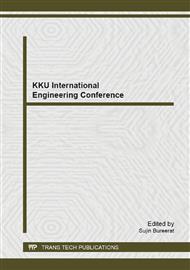[1]
IPCC, Guidelines for National Greenhouse Gas Inventory, Volume 1, Reporting Instructions, Revise 1996, Intergovernmental Panel on Climate Change, (1996).
Google Scholar
[2]
NIES, Asian Low Carbon Society Research Project, Report, National Institute for Environmental Studies, Japan, (2011).
Google Scholar
[3]
WCTRS, Putting Transport into Climate Policy Agenda - Recommendations from WCTRS to COP18, Report, World Conference on Transport Research Society, (2012).
Google Scholar
[4]
G. Emberger, Urban Development Sustainable Cities and ITS, KKU Engineering Journal, Vol. 34, No. 5, 2007, P. 499-516.
Google Scholar
[5]
SIRDC, Feasibility Study of Clean Development Mechanism (CDM) Project in Transportation sector, Final Report, Sustainable Infrastructure Research and Development Center, Khon Kaen University and Office of Transport and Traffic Policy and Planning, Ministry of Transport, Thailand, (2007).
DOI: 10.5481/kkujgs.2009.09.1.5
Google Scholar
[6]
SIRDC, Feasibility Study of Clean Development Mechanism (CDM2) Project in Transportation sector (Phase 2), Final Report, Infrastructure Research and Development Center, Khon Kaen University and Office of Transport and Traffic Policy and Planning, Ministry of Transport, Thailand, (2009).
Google Scholar
[7]
SIRDC, A Study on the Development of Greenhouse Gas Emission Baseline Model in Transportation Sector of a Regional City Prototype and Evaluating the Possibility of Reducing Greenhouse Gas Emission in Transportation Sector of Thailand, A Final Report, Sustainable Infrastructure Research and Development Center, Khon Kaen University and Thailand Greenhouse Gas Management Organization, Thailand, (2011).
DOI: 10.4028/www.scientific.net/amr.734-737.1789
Google Scholar
[8]
SIRDC, A Master Plan of Khon Kaen Transit System, Final Report, Khon Kaen Municipality and Sustainable Infrastructure Research and Development Center, Khon Kaen University, Thailand, (2007).
DOI: 10.12982/vis.2022.003
Google Scholar
[9]
T. Satiennam, W. Satiennam, S. Gadsadayurat, S. Aranyasen, K. Srisa-ard, Study of Vehicle Kilometers of Travel and Fuel Consumption Rate for Estimating CO2 Emission of Vehicles Traveling in Khon Kaen City, KKU Engineering Journal, Vol. 41, No. 3, 2014. (In Thai)(Forthcoming).
Google Scholar
[10]
T. Yamane, Statistics: An Introductory Analysis, second ed., Harper and Row, New York, (1967).
Google Scholar
[11]
T. Satiennam, P. Tankasem, W. Satiennam, P. Jantosut, S. Detdamrong, A Potential Study of Bus Rapid Transit (BRT) Supporting Low Carbon Asian Developing City, Proceedings of the Eastern Asia Society for Transportation Studies, Vol. 9, 2013, P. 217.
DOI: 10.1016/j.iatssr.2015.03.002
Google Scholar
[12]
PCBK, Study to Develop Master Plan for Sustainable Transport System and Mitigation of Climate Change Impacts, Final Report, PCBK and Office of Transport and Traffic Policy and Planning, Ministry of Transport, Thailand, (2013).
Google Scholar


